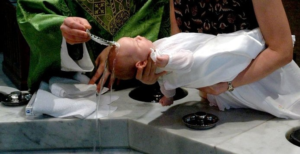by Rev. Matthew Zickler
 It was a warm night in May. I had just finished my junior year of college. That year had been very influential on me. I had gotten connected through a Bible study with a non-denominational Christian group called Navigators. The Lord had used that to draw me to hear that I was saved by grace through faith in Christ, and not by works, something I had never heard. Having heard that, my eyes were opened in a way they hadn’t been before. I reveled in studying the Bible like I never had. I had grown so much, and now here I was on a retreat with the Navigators, spending some intense time with other Christian brothers digging deeply into God’s Word. It felt as though my faith was so real right then that everything before was utter unbelief by comparison. In fact, as I walked around the retreat center, along the shores of the lake that was there, I thought just that. I didn’t really believe before. Yes, I had been baptized as an infant. Yes, I had been confirmed Roman Catholic. But I had not been a Christian before that. So, I prayed about that on the walk that night, and as I prayed, I was convinced I knew what God wanted me to do. He wanted me to be rebaptized.
It was a warm night in May. I had just finished my junior year of college. That year had been very influential on me. I had gotten connected through a Bible study with a non-denominational Christian group called Navigators. The Lord had used that to draw me to hear that I was saved by grace through faith in Christ, and not by works, something I had never heard. Having heard that, my eyes were opened in a way they hadn’t been before. I reveled in studying the Bible like I never had. I had grown so much, and now here I was on a retreat with the Navigators, spending some intense time with other Christian brothers digging deeply into God’s Word. It felt as though my faith was so real right then that everything before was utter unbelief by comparison. In fact, as I walked around the retreat center, along the shores of the lake that was there, I thought just that. I didn’t really believe before. Yes, I had been baptized as an infant. Yes, I had been confirmed Roman Catholic. But I had not been a Christian before that. So, I prayed about that on the walk that night, and as I prayed, I was convinced I knew what God wanted me to do. He wanted me to be rebaptized.
I was so excited at the thought of this, the thought of so publicly dedicating my life to Christ that I went back to the lodge where the other guys were already in bed, and I woke two of them up. The one, who had been the leader of my Bible study that year, I was going to have perform the baptism; the other, a good friend for many years, would be the witness. Thank God for what my Bible study leader told me: he didn’t think I needed to be rebaptized. He was very kind about it. He told me that if I was going to be rebaptized that he shouldn’t be the one to do it. But he just didn’t think I needed it.
That fall I became Lutheran, but that experience always stuck with me. In fact, the night before I was confirmed, I went through a bit of a crisis still unsure that infants should be baptized. But just as the Lord had kept me from being rebaptized, He also led me to understand that infants can believe. It’s His work whether we are nine days or ninety years old, so I shouldn’t get hung up on the human aspect of it. In particular, Jesus said, quoting the Psalm, “Out of the mouths of infants and nursing babies you have prepared praise” (Matthew 21:16). So, if God prepares praise from them, they must believe—humans can’t praise Him without faith. But even as I grasped that, it was years later when I came to understand just why rebaptism was so unnecessary. It was when I read a work of Luther called Concerning Rebaptism that it became clear. In fact, it was upon reading that work that I came to truly understand what it meant to be Lutheran.

Luther wrote Concerning Rebaptism in 1528. Not many years before that, the Reformation had gone far beyond what Luther had intended. He had wanted merely a reformation of certain errors in the Church, but during his absence at the Wartburg, it spread out of control. In particular, this disorder flowed out of what we call the “Radical Reformation,” which manifested itself in a group called the “Anabaptists” (the prefix “ana-” means again, so the Anabaptists taught that you had to baptize “again”). The Anabaptists took Luther’s understanding of salvation by grace through faith and abused it. Their understanding was that faith was all that was needed. Some even went so far as to say that you didn’t even need Scripture. You could just have faith and you could know what God was telling you. You could in fact just have the Holy Spirit come to your heart and God would speak directly to you. However, this faith was something that infants didn’t have. Therefore, one needed to be an adult to be baptized. The Anabaptists pointed to Mark 16:16 which said, “All who believe and are baptized will be saved.” They said that since belief was listed first, it had to happen first in chronological order. Belief had to come first, then baptism. As a note, this idea is in many ways the same held by many Baptists in our day.
Luther knew this was incorrect, so he took up his pen and he wrote about rebaptism. Now, the writing Concerning Rebaptism was actually a response to two pastors in a Roman Catholic diocese, and so Luther spent significant time discussing things relating to the errors of Roman Catholicism. But what he says there about Baptism is pure gold that shines with the light of God’s Word.
The Anabaptists said that if you were baptized as an infant you couldn’t even know if you were baptized. Luther responded, “Were I to reject everything which I have not seen or heard, I would indeed not have much left, either of faith or of love, either of spiritual or of temporal things. I might reply, ‘My friend, how do you know that this man is your father, this woman is your mother?’”[1] His point was that there is a lot we have not seen, and if we cannot believe that which we have not witnessed or don’t remember witnessing, we can know hardly anything—even who our parents are.
 How can you know you were baptized? First, baptism “is a work of God, not invented by man but commanded by God and witnessed to by the gospel. Secondly, there are people who can witness to the fact that you have been baptized, and no one can contradict or prove the opposite. In the third place, there is the work, i.e., you are reckoned among Christians, admitted to the sacrament, and to the use of all Christian privileges. This would not be the case if you had not been baptized and all were not sure of it.”[2] You know you have been baptized because God and others were witness to it. The Church treats you as a Christian.
How can you know you were baptized? First, baptism “is a work of God, not invented by man but commanded by God and witnessed to by the gospel. Secondly, there are people who can witness to the fact that you have been baptized, and no one can contradict or prove the opposite. In the third place, there is the work, i.e., you are reckoned among Christians, admitted to the sacrament, and to the use of all Christian privileges. This would not be the case if you had not been baptized and all were not sure of it.”[2] You know you have been baptized because God and others were witness to it. The Church treats you as a Christian.
Then he goes on to acknowledge just how important faith is in relation to baptism: “It makes it a matter of every man’s conscience to realize that if he is to be saved he must believe and not pretend that it is sufficient for a Christian to be baptized.”[3] Faith must absolutely be present to be saved. Even if one is baptized, without faith it is of no benefit. But Jesus is there in baptism, and He is the One who gives faith at the outset: “We can hardly deny that the same Christ is present at baptism and in baptism, in fact is himself the baptizer, who in those days came in his mother’s womb to John [the Baptist]. In baptism, he can speak as well through the mouth of the priest, as when he spoke through his mother. Since then he is present, speaks, and baptizes, why should not his Word and baptism call forth spirit and faith in the child as then it produced faith in John?”[4]
Even more so, when it comes to bringing children to baptism, “[Jesus] commands us to bring the children to him. In Matt. 19[:14] he embraces them, kisses them, and says that theirs is the kingdom of heaven. The misled spirits like to fend this off by saying, Christ is not speaking of children, but of the humble. But this is a false note, for the text clearly says that they brought to him children, not the humble.”[5]
Some might argue that this doesn’t prove anything because Jesus didn’t specifically command the baptism of children. Luther’s response: “Neither has he specifically commanded the baptism of adults, nor of men or of women, so we had better not baptize anybody.”[6] Jesus hasn’t specified any particular sort of person to baptize. He said, “all nations.” So, either we can baptize children, as a they are a part of that, or if logic precludes children, then we can baptize no one.
 Continuing, then Luther builds his argument to what really makes us unique from every other Christian church body: trust in the promise of God’s Word. That is, we believe we have the gifts God gives because those gifts are made certain by God’s promise. They don’t depend on the strength of our faith, but the trustworthiness of the One who spoke them. “The unchanging Word of God, once spoken in the first baptism, ever remains standing, so that afterwards they can come to faith in it, if they will, and the water with which they were baptized they can afterwards receive in faith, if they will. Even if they contradict the Word a hundred times, it still remains the Word spoken in the first baptism. Its power does not derive from the fact that it is repeated many times or is spoken anew, but from the fact that it was commanded once to be spoken.”[7]
Continuing, then Luther builds his argument to what really makes us unique from every other Christian church body: trust in the promise of God’s Word. That is, we believe we have the gifts God gives because those gifts are made certain by God’s promise. They don’t depend on the strength of our faith, but the trustworthiness of the One who spoke them. “The unchanging Word of God, once spoken in the first baptism, ever remains standing, so that afterwards they can come to faith in it, if they will, and the water with which they were baptized they can afterwards receive in faith, if they will. Even if they contradict the Word a hundred times, it still remains the Word spoken in the first baptism. Its power does not derive from the fact that it is repeated many times or is spoken anew, but from the fact that it was commanded once to be spoken.”[7]
So, even if for some reason the child would fall away from the baptismal faith, there is no need to repeat it. The Word still stands as promised. Jesus commanded us to baptize (Matthew 28:19), and He promises that this does something (see Mark 16:16; John 3:5; and in the Epistles: Romans 6:3-4; Colossians 2:11-12; Galatians 3:27; Titus 3:4-8; Ephesians 5:26; Hebrews 10:22; and 1 Pet 3:21. Notice in all of these passages that baptism doesn’t symbolize something. It actually does it. God’s Word does what it says, Is 55:11). Therefore, the Word still stands true because it is a certain Word.
In fact, Luther says, “It was a correct baptism in itself, regardless of whether it was received rightly. For the words were spoken and everything that pertains to baptism was done as fully as when faith is present. If a thing is in itself correct you do not have to repeat it even though it was not correctly received. You correct what was wrong and do not have to do the entire thing over. Abuse does not change the nature of a substance, indeed it proves the substance. There can be no abuse unless the substance exists.”[8] Just because God’s word in baptism is abused by unbelief, the substance of that baptism still remains. He argues, “Should then human error and wickedness be stronger than God’s good and invincible order?”[9] Certainly not, God’s Word far exceeds human weakness, and so baptism does not depend on the weakness of man, but on the strength and perfection of the Lord.
 To clarify this, Luther goes on to explain the benefit of this. If man has to depend on his faith to be sure of his baptism, he’ll always be standing on shaky ground. “As often as he falls or there is doubt about his faith, I will say, he doesn’t believe, his baptism is defective. In short, he will have to be baptized over again so often that he never again falls or is without faith, if he is to do justice to the verse, ‘Whoever believes.’ Tell me, what Christian will then ever be sufficiently baptized or consider that his baptism is completed? But verily baptism can be correct and sufficient even if the Christian falls from faith or sins a thousand times a year. It is enough that he rights himself and becomes faithful, without having to be rebaptized each time.” [10] In other words, “Nothing is lacking in baptism. Always something is lacking in faith.”[11] And so, “they must confess that in the first baptism it was not the Word of God that was defective, but faith, and that what is needed is another faith and not another Word.”[12]
To clarify this, Luther goes on to explain the benefit of this. If man has to depend on his faith to be sure of his baptism, he’ll always be standing on shaky ground. “As often as he falls or there is doubt about his faith, I will say, he doesn’t believe, his baptism is defective. In short, he will have to be baptized over again so often that he never again falls or is without faith, if he is to do justice to the verse, ‘Whoever believes.’ Tell me, what Christian will then ever be sufficiently baptized or consider that his baptism is completed? But verily baptism can be correct and sufficient even if the Christian falls from faith or sins a thousand times a year. It is enough that he rights himself and becomes faithful, without having to be rebaptized each time.” [10] In other words, “Nothing is lacking in baptism. Always something is lacking in faith.”[11] And so, “they must confess that in the first baptism it was not the Word of God that was defective, but faith, and that what is needed is another faith and not another Word.”[12]
As I say all of this, it bears repeating, that this is not to say that faith is unimportant. It certainly is. “True, one should add faith to baptism. But we are not to base baptism on faith. There is quite a difference between having faith, on the one hand, and depending on one’s faith and making baptism depend on faith, on the other.” .[13] Likewise, “it is not of benefit to the baptized one who is without faith, because of his lack of faith, but the baptism is not thereby incorrect, uncertain, or of no meaning.”[14] In fact, if we base it all on our faith that’s a problem. “Whoever allows himself to be baptized on the strength of his faith, is not only uncertain, but also an idolator who denies Christ. For he trusts in and builds on something of his own, namely, on a gift which he has from God, and not on God’s Word alone.”[15]
And that’s the crux of it right there. When we depend on ourselves, our strength, our goodness, even our faith, it will fail. In fact, when we build our house on anything but the rock it will be destroyed. Idols will all fall away. The word of God, however, never will. It will remain forever. Thanks be to God it doesn’t depend on us. It depends on the One who spoke creation into existence by His very Word. It depends on that Word Incarnate in Jesus of Nazareth. It depends on His death and resurrection. It depends on the Word that because He has been raised, we too will be raised. It depends on the promise of that Word when I was held over the font almost 36 years ago and the Word, “I baptize you in the Name of the Father, and of the Son, and of the Holy Spirit,” was spoken with the water, that God Himself promised  that every one of my sins was closed behind the seal of Christ’s tomb and I have now been raised in His resurrection.
that every one of my sins was closed behind the seal of Christ’s tomb and I have now been raised in His resurrection.
That evening many years ago I thought it depended on me. Often, my prideful nature still acts like it depends on me. Often, I still want to pretend like I am in charge, even that I am God. But I’m not. Thanks be to the God who is.
The Rev. Matthew Zickler is pastor of Grace Lutheran Church, Western Springs, Ill.
[1] Martin Luther, Luther’s Works, Vol. 40: Church and Ministry II, ed. Jaroslav Jan Pelikan, Hilton C. Oswald, and Helmut T. Lehmann, vol. 40 (Philadelphia: Fortress Press, 1999), 234.
[2] Ibid, 239.
[3] Ibid, 241.
[4] Ibid, 242–243.
[5] Ibid, 243.
[6] Ibid, 245.
[7] Ibid, 249.
[8] Ibid, 246.
[9] Ibid, 247.
[10] Ibid, 247–248.
[11] Ibid, 253.
[12] Ibid, 261.
[13] Ibid, 252.
[14] Ibid, 252–253.
[15] Ibid, 252.
